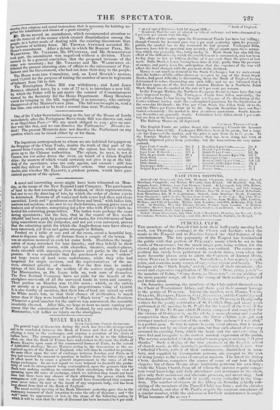A novel and interesting scene might have been witnessed on
Mon- day, at the rooms of the New Zealand Land Company. The purchasers of land in the first township of New Zealand, or their representatives, had met to see the drawing of lots, by which the order of choice was to be determined. Persons of all ranks and both sexes had then and there assembled. Lords and " gentlemen well-born and bred," with ladies thir, matrons and maidens, were met to try their fortune, among grave men of business and of science, comprising not a few who with PENN'S faith in- herited his colonizing propensities. The ladies were perhaps the most daring speculators ; but the fitct, that in the course of five weeks 100,0001. had been paid, by persons of all ranks, for 100,000 acres of land lying somewhere near the antipodes, and not yet even surveyed, proves that the colonizing spirit for which the Anglo-Saxon race have always been renowned, yet lives and gains strength in Britain. Perched on a table at one end of the room, stood a beautiful boy, about to dispense the gifts of fortune from a couple of tin boxes. It was an anxious moment as each lot came forth. Doubtless the imagi- nation of many stretched far into futurity, and they beheld in their mind's eye splendid towns, with churches, theatres, market-places, docks crowded with argosies, even palaces and parks in the laud of promise. It was remarkable that the purchasers of many " orders " and large tracts of land were unfortunate, while they who had bargained for single sections, and the representatives of the na- tives, obtained priority of choice. For the first time in under- takings of this kind was the welfare of the natives really regarded. The Missionaries, as Dr. LANG tells us, took care of themselves. The New Zealand Company have set aside for the benefit of the aborigines one-tenth of all the surveyed lands in town and country. Their portion on Monday was 11,100 acres ; which, as the orders are already at a premium, bears the proportionate value of 12,000/. It is also worthy of mention, that their lots of land arc mixed tip with the White 'lien's lots, so that their chance of civilization is much better than if they were banished to a " Black town" on the frontiers. Whenever a good number for the natives was announced, the assembly Invariably cheered. After this, we hope to hear no more canting pre- tences that the colonization of New Zealand, by any save the jobbing Missionaries, will inflict an injury on the aborigines.


























 Previous page
Previous page